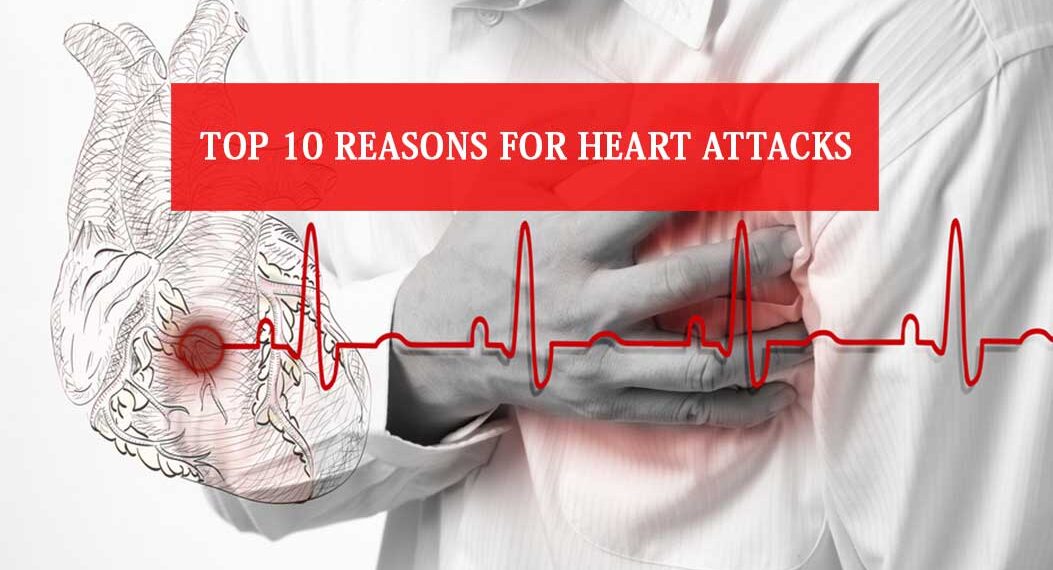The blockage of blood flow to the heart results in a heart attack. In most cases, the reasons for the block are an accumulation of fat and cholesterol in the coronary arteries. This accumulation is called a plaque, and it blocks the flow of oxygenated blood in the heart.
A heart attack is indeed a serious condition that can prove fatal if untreated. It is, therefore, of utmost importance to get yourself checked by a doctor if you suspect a heart attack. Time is of the essence, and prompt treatment has saved many a life till now.
Main Reasons for a Heart Attack
- Aging: As people age, they are more prone to heart attacks. Men over 45 years and women over 55 years are at a higher risk. Aging is, of course, a natural process; we cannot control it. However, what we can control are certain lifestyle modifications that bring down the risk of a heart attack as we get older. These changes include eating a healthy diet, exercising and stopping smoking from naming a few. Even though many of us may already be aware of this, we might not be putting it into practice. These changes can indeed be the difference between suffering and escaping a heart attack, so do bring about these changes immediately.
- Smoking: This evil is something we can do without. Other than causing cancer and increasing the chances of suffering a stroke, smoking also affects the heart. Passive smokers who inhale the smoke are also at risk. Smoking not only narrows the arteries, but it also increases the chances of plaque formation in the arteries. Blood clot formation is also attributed to smoking, which in turn increases the risk of heart attacks.
- Hypertension: High blood pressure or hypertension affects the heart in a myriad of ways. It damages arteries and inhibits the supply of blood to the heart. It increases the load on the heart and makes it work a lot harder; this causes thickening of the left ventricle, which in turn can result in a heart attack. When people suffer from hypertension for a long duration, their heart’s efficiency is reduced, and the heart consequently gives out.
- High Cholesterol: The liver produces cholesterol; we also get cholesterol from the food we consume. When the cholesterol exceeds a certain level, it becomes a risk factor for heart attacks. This is because the excess cholesterol accumulates in the arteries and affects the blood flow to the heart. When blood flow to the heart is obstructed completely, people suffer a heart attack. Here it is important to note that there are two kinds of cholesterol – HDL or good cholesterol and LDL or bad cholesterol. HDL reduces the risk of plaque formation, while LDL increases it.
- Diabetes: Diabetics have an increased risk of developing heart disease. This risk is more pronounced for people having type -2 diabetes. Elevated blood sugar levels damage blood vessels. This is because the excess sugar accumulates in the blood. This, in turn, injures the blood vessels, and as a result, the blood supply to the heart is affected.
- Obesity: India has around 135 million obese individuals, with obesity being more prevalent in cities than villages. Abdominal obesity is a significant cause of heart disease. Obesity leads to an increase in bad cholesterol and a decrease in good cholesterol. It also leads to hypertension as the volume of blood to be pumped through the body is more. Obesity and diabetes go hand in hand and the risk of heart disease for a person who is both obese and diabetic doubles when compared to an average person.
- Family History: If many members in your family have suffered heart attacks, then the risk of you suffering one is also more. We cannot bring about genetic changes to reduce the risk of a heart attack due to family history. Hence, here again, lifestyle changes are what matter; the concept of following a healthy lifestyle cannot be stressed enough. Healthy food choices and sufficient exercise are the factors that can reduce the risk of heart attack even if your family history is not conducive.
- Stress: There are several ways by which stress may contribute to a heart attack. When a person is always stressed, the adrenaline level stays high for long durations. This is not good for the body. Stress could also elevate the blood pressure further in a person who is already suffering from hypertension. Research has also shown that even blood clot formation is affected by stress.
- Illicit Drug Usage: Most of the illegal drugs like cocaine, heroin, etc. affect the cardiovascular system in a multitude of ways. For starters, they can change the heart rate and spike up the blood pressure. They can also damage the muscles and the walls of the heart, thus preventing them from functioning normally. When the heart doesn’t work efficiently, the flow of oxygen-rich blood to the brain and other organs is impaired. The brain may suffer damage because of this, and in other organs, too, tissue death or necrosis might be the result.
- Autoimmune Diseases: In persons who suffer from autoimmune diseases, the healthy cells are attacked by the antibodies produced by the body’s immune system. Typically antibodies protect the body against viruses and bacteria, but in this condition, the antibodies attack the healthy cells of the body. Autoimmune diseases increase the risk of heart attack as they build up cholesterol in the blood vessels and contribute to plaque formation.
The symptoms of heart attack vary from person to person. They include pain in the chest and arms, which may radiate towards the neck and back, heartburn, indigestion, sweating, breathlessness, exhaustion, and unsteadiness. If you are suffering from any of these symptoms or suspect a heart condition, do not take it lightly. Your heart deserves the best care from the best cardiologist in Chennai, so consult one without further delay.
To book an appointment with Kauvery Doctors Please Call +91 44- 4000 6000 or mail@ info@kauveryhospital.com























